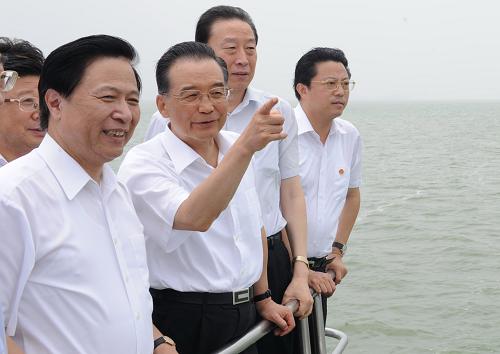Wen: China's Economic Policies Unchanged
Adjust font size:
|
|
|
Chinese Premier Wen Jiabao (Front 2nd L) gestures onboard a boat during an inspection on the pollution treatment work on Taihu Lake in Wuxi city, eastern China's Jiangsu Province on Friday, August 7, 2009. [Xinhua] |
Chinese Premier Wen Jiabao reaffirmed during the weekend that China would unwaveringly adhere to its moderately easy monetary policy in face of economic difficulties and challenges.
Wen said China would maintain both its proactive fiscal and moderate monetary policies, and work on economic restructuring to strengthen recovery from the global downturn.
During a three-day inspection tour that ended Sunday in the eastern Jiangsu Province, one of China's economic powerhouses, Wen said China should focus on maintaining stable and rapid economic development and accelerating economic restructuring.
China's economy still faced hardships and challenges because of the gloomy international economic outlook, he said. With weakened external demand, Chinese enterprises faced significant overcapacity, while domestic demand was still restricted by various factors.
The impact of governmental stimulation of the economy would gradually lessen and long-term policies needed time to pay off, Wen said. Therefore, China's macroeconomic policy would not change.
The premier's remarks echoed a similar announcement made by a senior economic planning official Friday that overseas market conditions were still severe and the country's economic policy direction would remain unchanged.
Although the country's economy was showing signs of recovery, it still faced many difficulties in maintaining stability, said Zhu Zhixin, vice minister in charge of the National Development and Reform Commission.
On his third visit to Jiangsu since the global financial crisis hit, Wen also praised "better-than-expected" results in eliminating pollution from the country's third largest fresh water lake Taihu over the past two years, since a blue algae outbreak in 2007.
Wen was told that more than 3,000 small chemical plants surrounding the lake had been closed and about 1,000 new facilities had been installed to treat sewage from nearby villages into the lake.
(Xinhua News Agency August 10, 2009)

